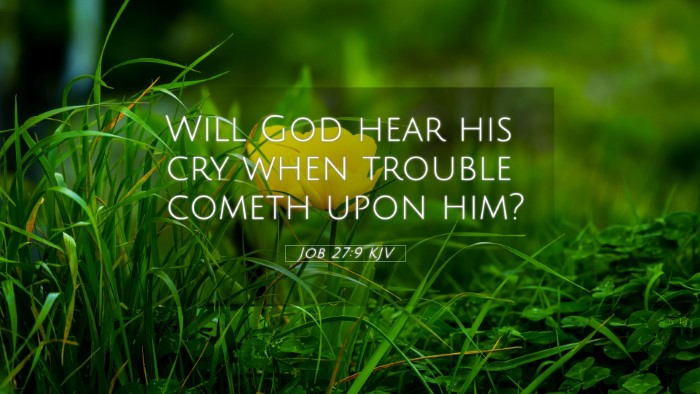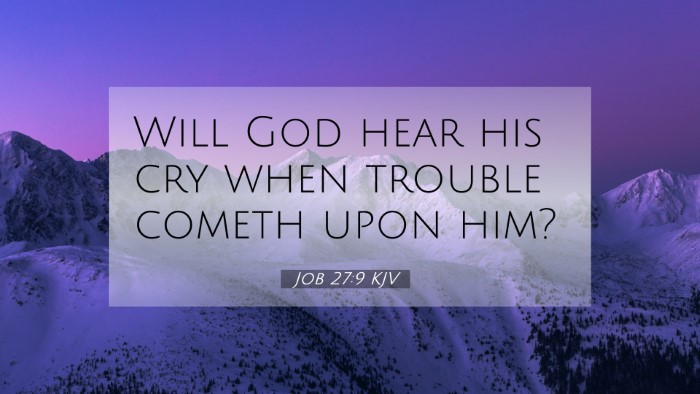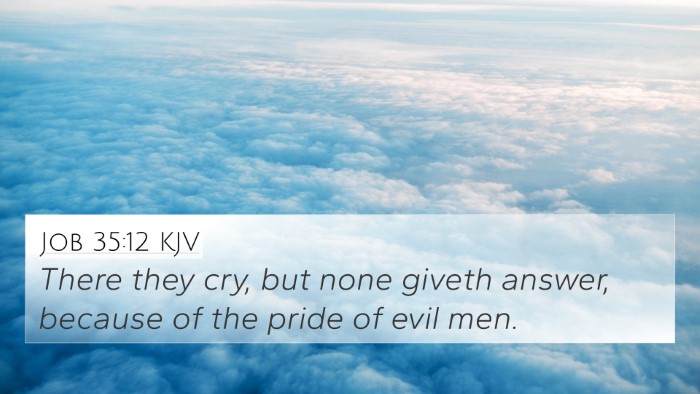Old Testament
Genesis Exodus Leviticus Numbers Deuteronomy Joshua Judges Ruth 1 Samuel 2 Samuel 1 Kings 2 Kings 1 Chronicles 2 Chronicles Ezra Nehemiah Esther Job Psalms Proverbs Ecclesiastes Song of Solomon Isaiah Jeremiah Lamentations Ezekiel Daniel Hosea Joel Amos Obadiah Jonah Micah Nahum Habakkuk Zephaniah Haggai Zechariah MalachiJob 27:9 Similar Verses
Job 27:9 Cross References
Will God hear his cry when trouble cometh upon him?
Uncover the Rich Themes and Topics of This Bible Verse
Listed below are the Bible themes associated with Job 27:9. We invite you to explore each theme to gain deeper insights into the Scriptures.
Job 27:9 Cross Reference Verses
This section features a detailed cross-reference designed to enrich your understanding of the Scriptures. Below, you will find carefully selected verses that echo the themes and teachings related to Job 27:9 KJV. Click on any image to explore detailed analyses of related Bible verses and uncover deeper theological insights.

Jeremiah 14:12 (KJV) »
When they fast, I will not hear their cry; and when they offer burnt offering and an oblation, I will not accept them: but I will consume them by the sword, and by the famine, and by the pestilence.
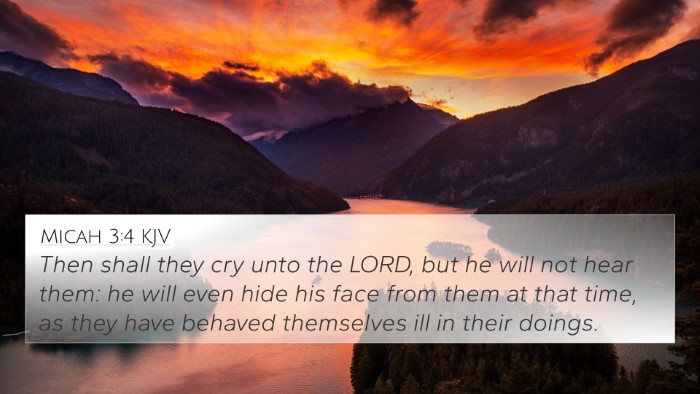
Micah 3:4 (KJV) »
Then shall they cry unto the LORD, but he will not hear them: he will even hide his face from them at that time, as they have behaved themselves ill in their doings.
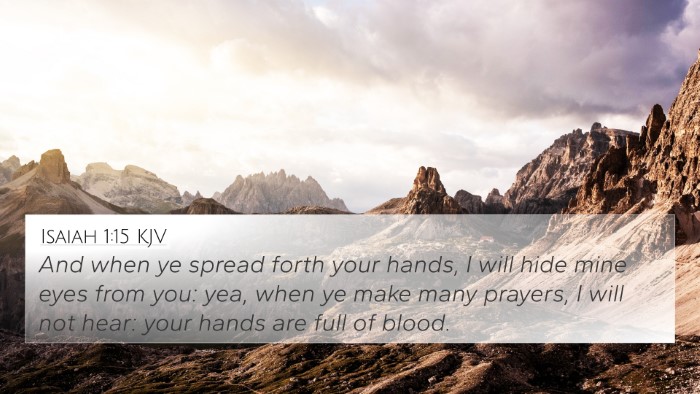
Isaiah 1:15 (KJV) »
And when ye spread forth your hands, I will hide mine eyes from you: yea, when ye make many prayers, I will not hear: your hands are full of blood.

Proverbs 1:28 (KJV) »
Then shall they call upon me, but I will not answer; they shall seek me early, but they shall not find me:

Psalms 18:41 (KJV) »
They cried, but there was none to save them: even unto the LORD, but he answered them not.
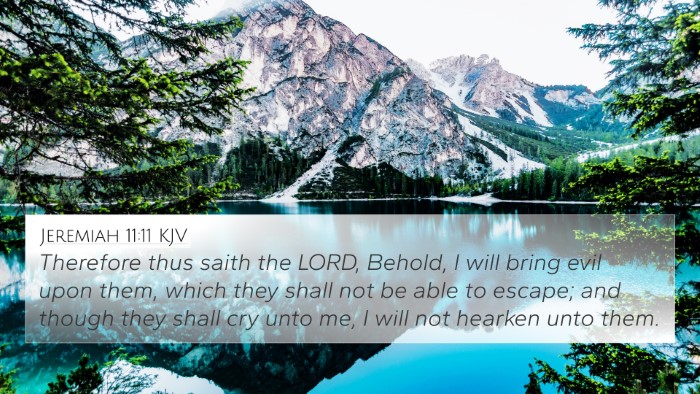
Jeremiah 11:11 (KJV) »
Therefore thus saith the LORD, Behold, I will bring evil upon them, which they shall not be able to escape; and though they shall cry unto me, I will not hearken unto them.
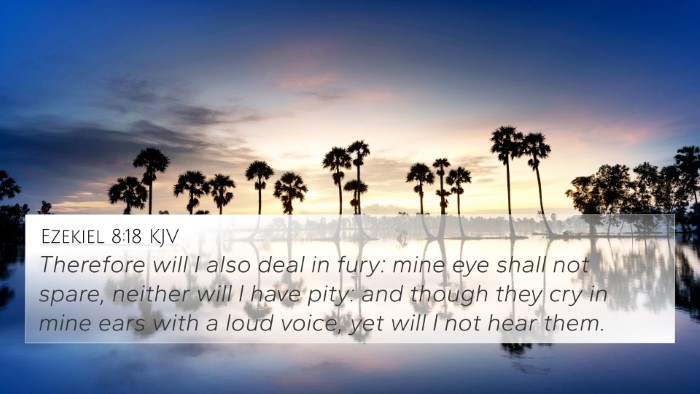
Ezekiel 8:18 (KJV) »
Therefore will I also deal in fury: mine eye shall not spare, neither will I have pity: and though they cry in mine ears with a loud voice, yet will I not hear them.
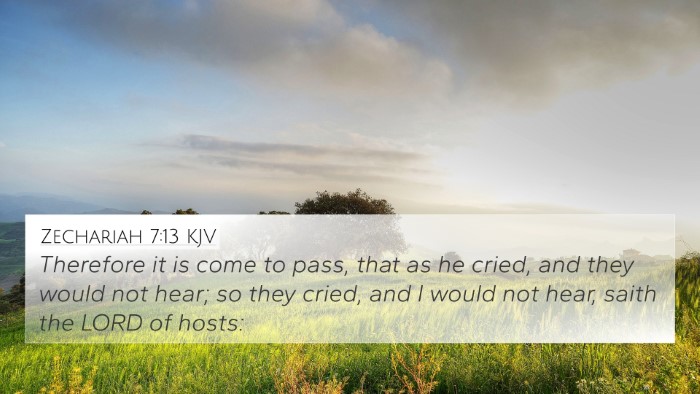
Zechariah 7:13 (KJV) »
Therefore it is come to pass, that as he cried, and they would not hear; so they cried, and I would not hear, saith the LORD of hosts:
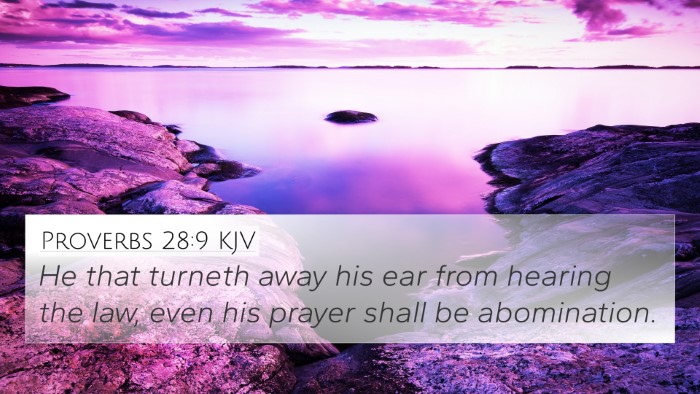
Proverbs 28:9 (KJV) »
He that turneth away his ear from hearing the law, even his prayer shall be abomination.
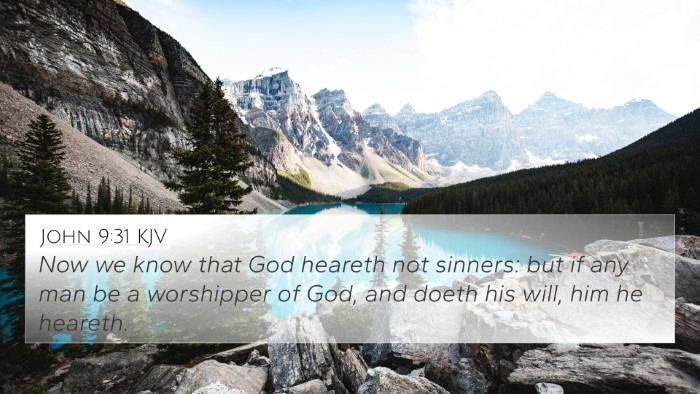
John 9:31 (KJV) »
Now we know that God heareth not sinners: but if any man be a worshipper of God, and doeth his will, him he heareth.

Luke 13:25 (KJV) »
When once the master of the house is risen up, and hath shut to the door, and ye begin to stand without, and to knock at the door, saying, Lord, Lord, open unto us; and he shall answer and say unto you, I know you not whence ye are:
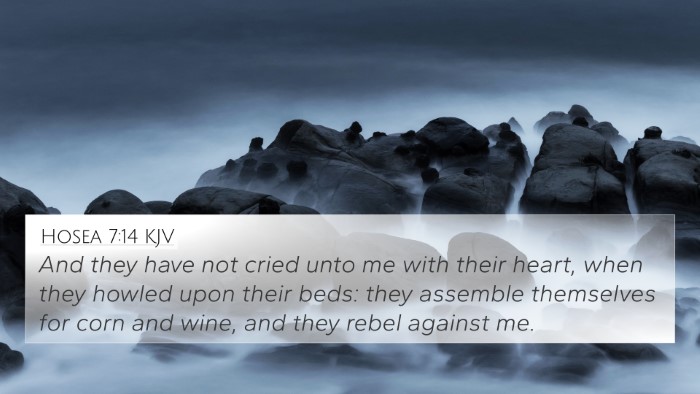
Hosea 7:14 (KJV) »
And they have not cried unto me with their heart, when they howled upon their beds: they assemble themselves for corn and wine, and they rebel against me.
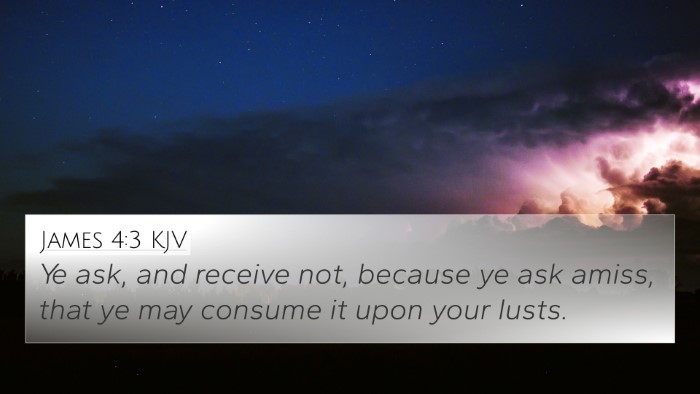
James 4:3 (KJV) »
Ye ask, and receive not, because ye ask amiss, that ye may consume it upon your lusts.
Job 27:9 Verse Analysis and Similar Verses
Understanding Job 27:9
In Job 27:9, we encounter a profound assertion made by Job regarding the nature of his integrity and the justice of God. Job states, "Will God hear his cry when trouble comes upon him?" This poignant question reveals Job’s intimate struggle with the idea of divine justice and the reliability of God in times of anguish.
Commentary Insights
Matthew Henry's Commentary
Matthew Henry asserts that Job reflects on the seeming silence of God in the face of his suffering. He emphasizes that Job believes in a God who does not disregard the cries of the afflicted. Henry notes that Job is confident that God hears the pleas of the righteous, asserting that the true heart of a believer longs for divine engagement, especially in distress.
Albert Barnes' Notes
Albert Barnes interprets this verse as Job recognizing that his claim of innocence is not just about external conditions but about the relationship between his soul and God. Barnes elaborates that Job's question implies a fundamental belief that God is just and will respond to the prayers of the righteous, thereby reinforcing the theme of divine justice and the vindication of believers in their plight.
Adam Clarke's Commentary
Adam Clarke places emphasis on the rhetorical nature of Job's question. He suggests that it is reflective of Job’s despair but also his hope for a just God. Clarke highlights that Job is fundamentally questioning whether God will respond to one who has been wronged, indicating his belief in an overarching moral order orchestrated by God.
Thematic Connections
Job 27:9 can be linked to several essential themes within the scriptures:
- The Nature of God’s Justice: The distinction between human understanding and divine providence is a recurring theme that can be found throughout the Bible.
- The Cry of the Righteous: Numerous verses (e.g., Psalms 34:17, Psalms 142:1-2) resonate with the idea of God hearing the cries of the afflicted.
- Integrity in Suffering: Job’s insistence on his innocence draws parallels with other biblical figures like Joseph (Genesis 39) who remained faithful amidst trials.
Cross-References for Job 27:9
To deepen the understanding of Job 27:9, it is valuable to explore cross-references:
- Psalm 9:12 - "For he who avenges blood remembers; he does not ignore the cries of the afflicted."
- Psalm 34:15 - "The eyes of the LORD are on the righteous, and his ears are attentive to their cry."
- Isaiah 59:1 - "Surely the arm of the LORD is not too short to save, nor his ear too dull to hear."
- James 5:16 - "The prayer of a righteous person is powerful and effective."
- 1 Peter 3:12 - "For the eyes of the Lord are on the righteous and his ears are attentive to their prayer."
- Proverbs 15:29 - "The LORD is far from the wicked, but he hears the prayer of the righteous."
- Lamentations 3:55-57 - "I called on your name, LORD, from the depths of the pit. You heard my plea: 'Do not close your ears to my cry for relief.'"
- Matthew 7:7 - "Ask, and it will be given to you; seek, and you will find; knock, and the door will be opened to you."
- Romans 10:13 - "For everyone who calls on the name of the Lord will be saved."
- Jeremiah 33:3 - "Call to me and I will answer you and tell you great and unsearchable things you do not know."
Conclusion
Job 27:9 exemplifies a crucial interaction within the larger narrative of Job, revealing the complexity of human suffering and faith. The explorations of commentaries illuminate the depth of Job's plight and the eternal character of God. This verse, along with its thematic connections and cross-references, forms a significant basis for understanding not only Job’s character but also the nature of God’s interaction with His creation, and the assurance that He hears our cries.
Further Study: Tools for Cross-Referencing
To enhance one’s study of the Bible and the connections between various scriptures, utilizing tools for Bible cross-referencing is essential. These tools can include:
- Bible Concordance - A helpful resource for locating verses and understanding their context.
- Bible Cross-Reference Guide - A tool to help identify parallels and related scriptures.
- Cross-reference Bible Study - Methodologies that enhance understanding through comparative analysis.
- Bible Chain References - Commentary systems that lead readers through scripture connections.
- Comprehensive Bible Cross-Reference Materials - Extensive compilations for in-depth study.

